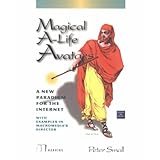
Average Reviews:

(More customer reviews)Are you looking to buy Magical A-Life Avatars? Here is the right place to find the great deals. we can offer discounts of up to 90% on Magical A-Life Avatars. Check out the link below:
>> Click Here to See Compare Prices and Get the Best Offers
Magical A-Life Avatars ReviewThis book has three subject matters which all run in parallel, informing and commenting on each other.These subjects are: * the relationship between biological entities and computer objects * the future of the internet * OOPs programming in Director
The book is very clearly and cleverly written. The Lingo scripting, for example, is discussed in the main text in terms of its underlying principles, and the actual scripts are shown in illustrations, reproducing Director's script window. This means that the underlying arguments can be read without interruption, and by readers who have no Lingo experience.
Indeed many of the arguments in the book are addressed to a much wider audience than Director users and Lingo programmers. Peter Small suggests through a series of analogies and practical examples that there may be less difference between human and artificial intelligence than is normally thought - if we concentrate on the effects of intelligence rather than getting caught up in arguments as to what intelligence is and where it comes from.
He uses a wide range of examples, introducing the idea of Hilbert Space as his final conceptual flourish. Against the odds he even manages to explain this abstruse mathematical concept clearly and simply, and then demonstrate convincingly how it can be a useful tool for thinking about the future development of multimedia.
Peter's concern with multimedia lies in the development of 'intelligent' multimedia entities that he refers to as avatars - entities which can grow and change, accessing information on local hard disks, on CD-Roms and on the world wide web. The primary difference between these and traditional bots is that they are designed to operate from a client oriented perspective, rather than the more usual server side emphasis. They are designed to grow organically, to exceed the original intentions of the original programmers. They are designed to be diverse and different, and to use that as a strength.
In many ways Peter is proposing a complete inversion of the way we currently see the Internet. It is usually seen as a new broadcasting medium - I have a website and you can tune into it. Peter suggests that this is a very limited and limiting way to see what is essentially a huge repository of information, all able to be communicated in any way we can imagine. He suggests that the idea of the standard, generalised browser is an idea whose time has more or less gone. Instead he proposes specialised avatar systems who can respond to their users needs and desires and extend themselves across the web to bring back information in useful and structured forms.
One of his demonstrations concerns the construction of a café which can be used to bring like-minded people together, while another concerns avatar web-bots which can be sent off in search of like-minded people to bring to the café. Both of these are described in terms of the fundamental principles, their likely effects - and the Lingo necessary to construct them.
For readers with no Lingo experience Peter provides convincing arguments with just enough technical detail to demonstrate that what he is talking about is not science fiction but can be done today with standard software.
For readers who do have Lingo experience, there is plenty to chew on in the accompanying illustrations of scripts. Here Peter provides the details of how various avatar systems can be built and extended. In addition to the café and web-bots, these include a chemist who is able to work out the correct set of ingredients from sixty million possible combinations in less than 38 steps, taking a second or less in total. Peter uses this as the basis for discussing genetic algorithms, which can be used to model complex thought processes, and which can learn from their experiences, becoming more intelligent the longer they are allowed to 'live'.
Most interestingly of all, though, Peter intends to work out the implications of what he is suggesting in practice on the web. The book is therefore a starting point for an experiment which will be carried out by Peter and anyone who wishes to join him.
The book is, in effect, an invitation to participate in a uniquely exciting experiment - and there aren't many books you can say that about.Magical A-Life Avatars OverviewWritten for designers and programmers who feel limited by conventional ways, here is a radically new and exciting approach to the design of products and services for the Internet and the World Wide Web. All concepts are introduced and illustrated with diagrams and simple examples rather than technical jargon.
Want to learn more information about Magical A-Life Avatars?
>> Click Here to See All Customer Reviews & Ratings Now
0 comments:
Post a Comment